When we started this seminar we were asked to write the expectations we had about it. I wrote I wanted to know what a complaint is. More than four months after this moment I think I still do not know what that is. In this post I share the path I have gone through to approach the definition of complain.
Going full cliché I check the definition online, it is a way to start:
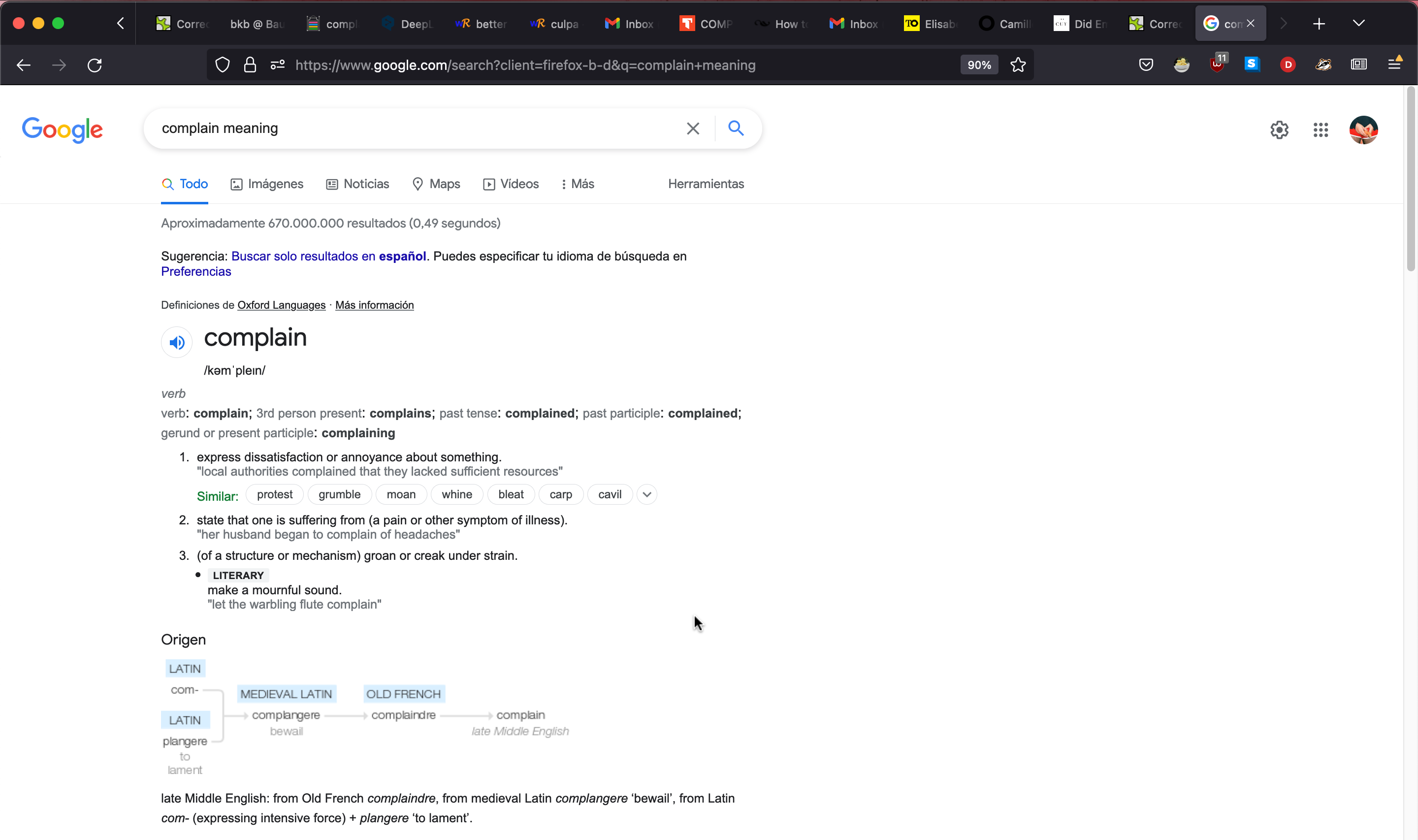
So complain is the act and the state.
This is big and ambiguous and I like ambiguous things. On the other hand, I spent the time I read the book wanting to know the definition Sara had for us. There was not such a thing like a moment where a ultimate definition of complaint was presented and I did not like that, somehow.
We (“we” as referring to “me” but feeling less lonely in this journey) passed the barrier of only considering complaining the formal filling forms format. For a really long part of the reading process I thought that was the case and that got me annoyed. Even if the explanations never closed the definition almost in any way, I was bitter with the writer. I could not believe this. Even though I know in page four (page four!) it clearly explains “a complaint can be an expression of grief, pain, or dissatisfaction, something that is a cause of a protest or outcry, a bodily ailment, or a formal allegation”. This was not enough for me. I just could not stop thinking about the -other- types of complaining that involve maybe unorthodox/impulsive/childish/and-so-on kind of behavior.
Then at some point I realized the writing style she has, repeating some structures or emphasizing by rerunning the sentences maybe adding a little bit more at a time or making minor changes. This is the moment I had the idea of collecting sentences from the book that might clear up my hesitations about the definition presented. I am really thankful about the “searching” tool in texts available in digital books. I take this moment to appreciate the Ctrl + F.

So as we all know, we can get the words and sentences we want from a text, in this case a whole book. For your information, you can find the word “complain” 251 times and “complaint” a total of 1686 times.
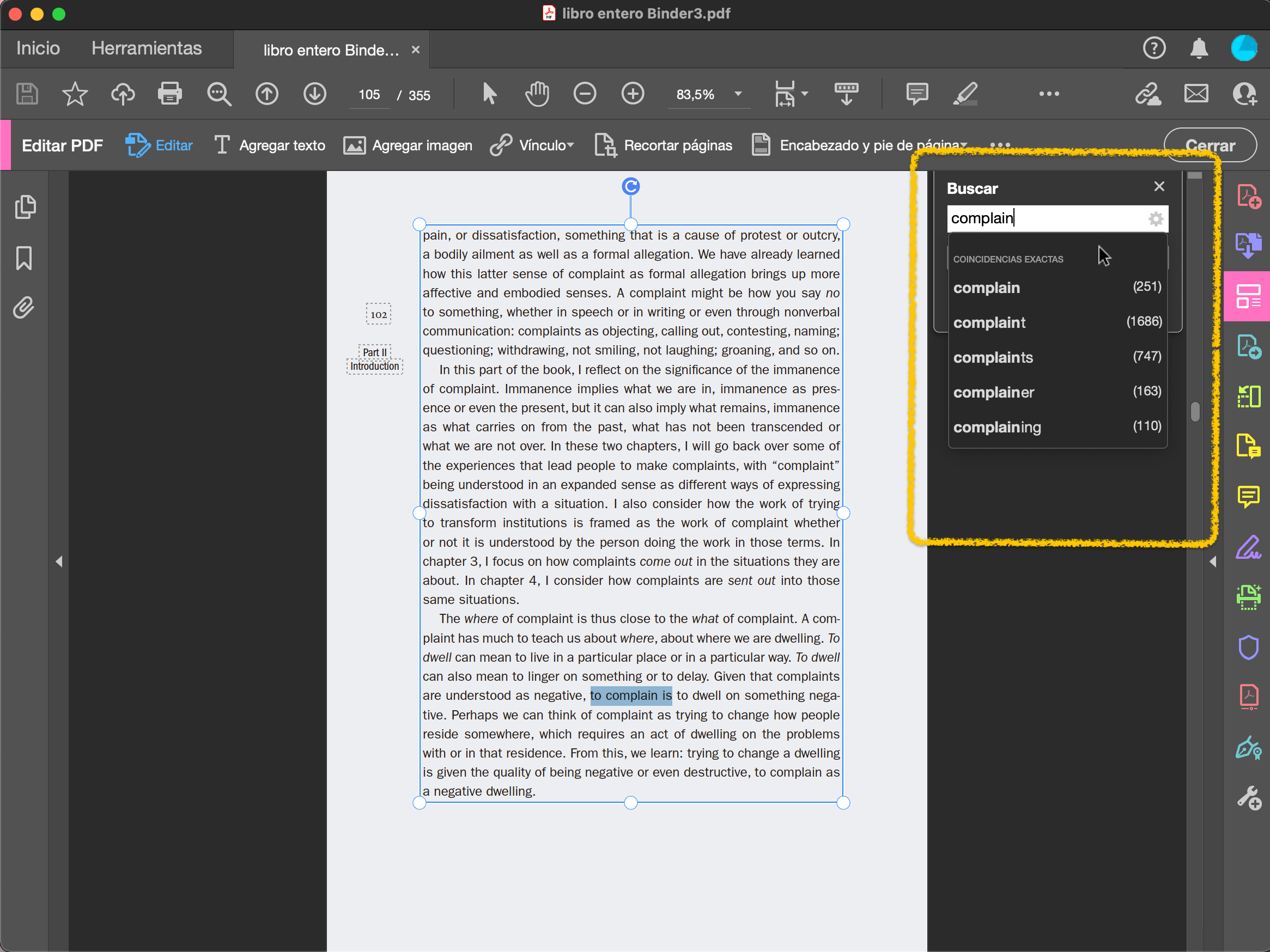
I searched for combos like “to make a complaint is”, “to complain is” or the longest one by far “complaint can”. I think the most useful one was this one:
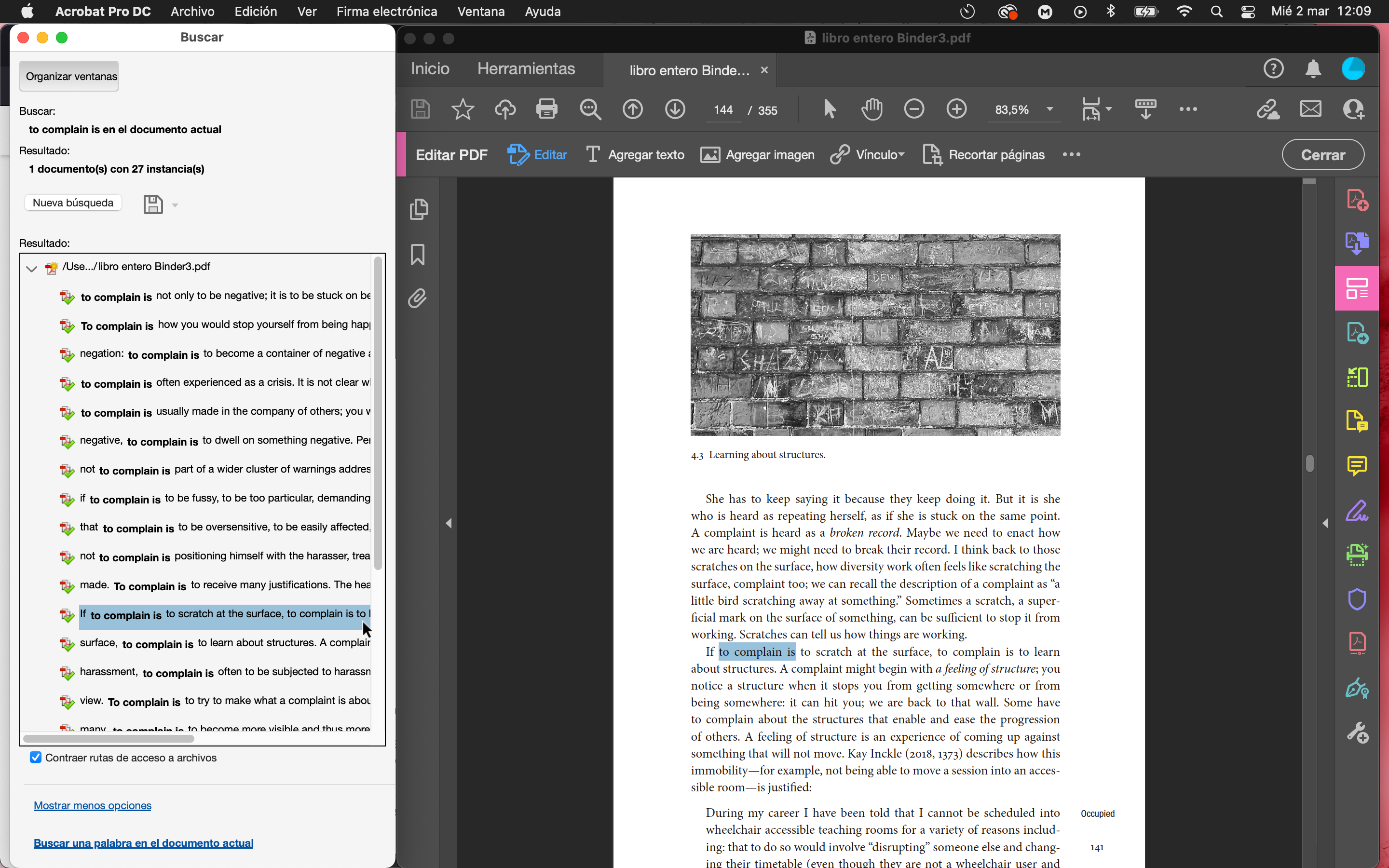
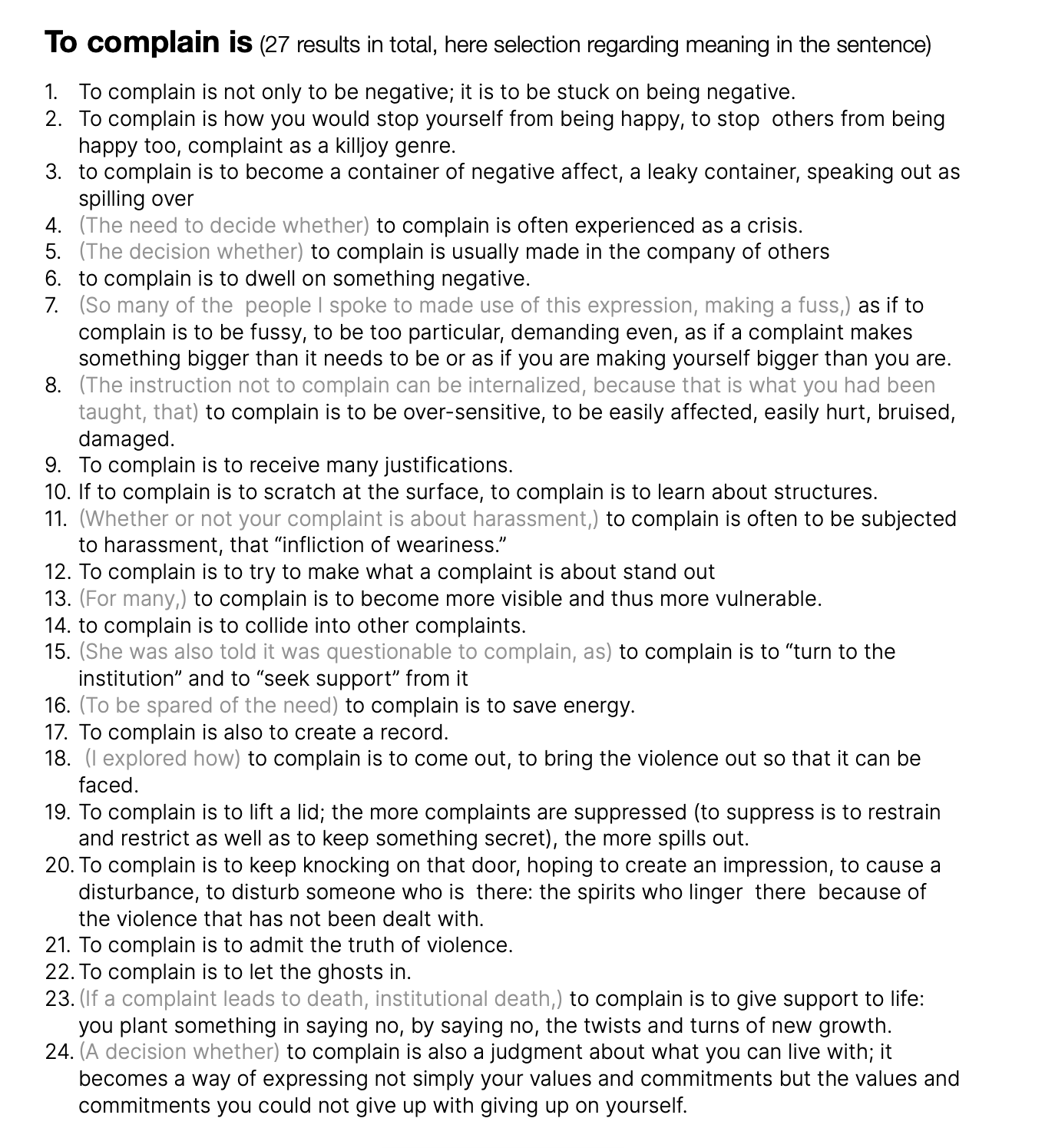
With this collection I satisfied a little bit my needs of definition, still as an ambiguous and big pool.
By the end of the book I finally was dazzled by what it seemed to be a strong statement who says:
(And it comes from a previous book from Sara in 2012: “On Being Included: Racism and Diversity in Institutional.”)
“If complaint can be understood as a phenomenology of the institution, complaint is a practical phenomenology“
While reading I also made many notes about what the institution/structure means to me and how I experience it. I might have been caressing the position of wanting to scape the structure but (sadly?) it is not that realistic. Complain ties us up with the institution. My initial aim was to avoid formal ways of complaining as I thought complaining the formal way would only show that I support the institution/structure. Why would I like to support such thing?
Complaining in non-formal ways ALSO knots us with structures. I wonder, could it be because structures are usually the thing to blame? So as we usually blame structures in formal and non-formal types of complaints that could be the link. Even if, for example, you are complaining about your grandpa having an old-fashioned way of thinking and him being intransigent, there is the structure of power+sexism to blame. Huh, how easy is this? If everything is a structure there is always a structure to blame.
I consider <<blame>> a really critical ingredient of complaining. I might talk about this in the future and how we can blame things that are bigger than us/our control.
So, yes, again in this ambiguous map I enjoy. The complaint is together with the institution/structure. But I was still thirsty for limits. I thought if I might not find the big limits of it, I could at least work with the content we know it is inside of it. Thats when I though of classifying the inside of complaint. The first approach was to make a diagram, a Venn one:
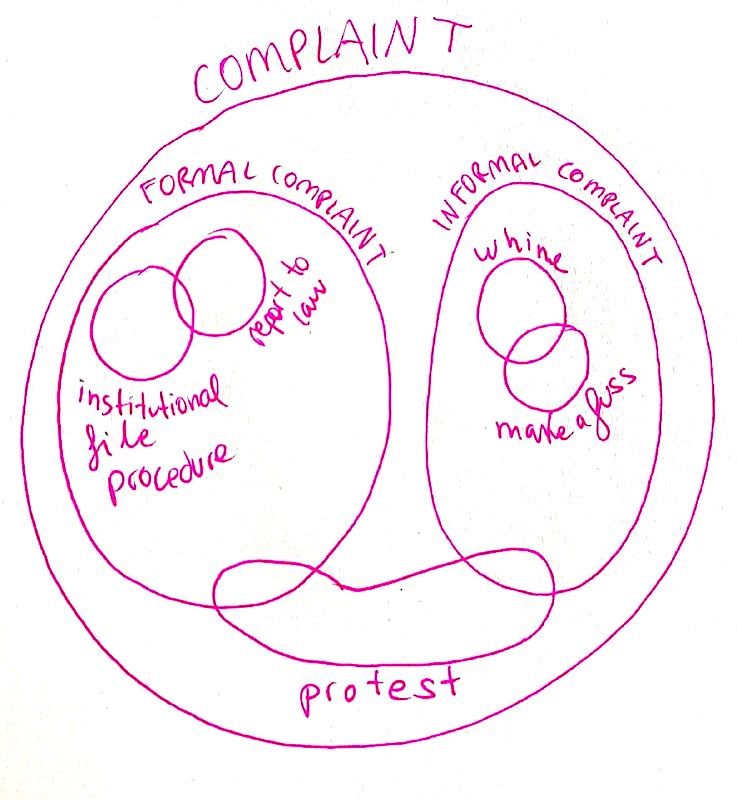
Obviously we have the big big circle that captures everything, called complaint, and inside of it the are two main types of complaint.
The most attractive part I find is the protest, and how it can be both at the same time (the joy of ambiguity strikes back!?). I would like to go deep about it in other post.
In future posts I will suggest as well a way of classifying complaints regarding their traits.
So yes, anyway, what is still the definition of complaint..?
One possible option: could everything be a complaint?
Is it like the definition of art by Dickie? He said something like “a work of art is an artifact upon which some person(s) acting on behalf of the artworld has conferred the status of candidate for appreciation“
yuhuuu then: “a complaint is an artifact upon which some person(s) acting on behalf of the complaintworld has conferred the status of candidate for appreciation”
Lets appreciate coomplaints in the complaintworld then!?
3 replies on “I do not know what a complaint is”
Hey! I found something that might help us delve a little deeper into this (since i had the same interest/question). In Sara Ahmed’s words:
“A complainer in being expressive becomes a moaner, moaning about minor matters. And maybe too the quality of being minor is transferred to the subject of a complaint; the one who makes a complaint can become a minor condition, an irritant in the fabric of institutional life. Minor also seems to evoke the minority: complaint as the discourse of minorities”.
I love the diagram! I really like how “protest” is between formal and informal complaint. What I find super interesting is how the subcategories of the informal complaint are negatively connoted. How do you feel about this? Is informal complaining more about nagging?
I realised it is mainly me adding this label of less-worthy to the informal ones. This is funny because I am trying to explain th opposite. Yeah… I guess the informal type of complaint is more oppen and it can include the nagging as well 🙂